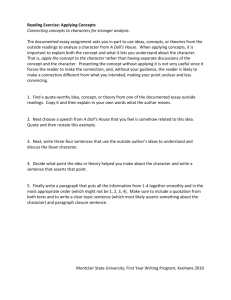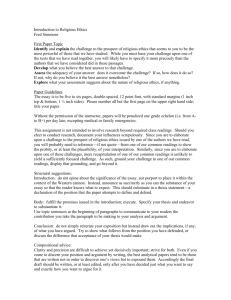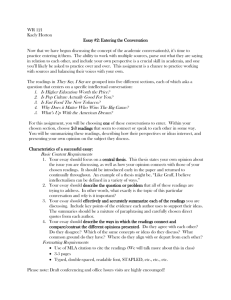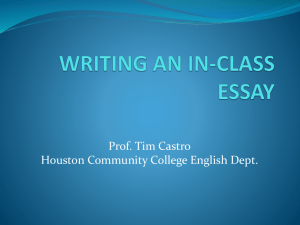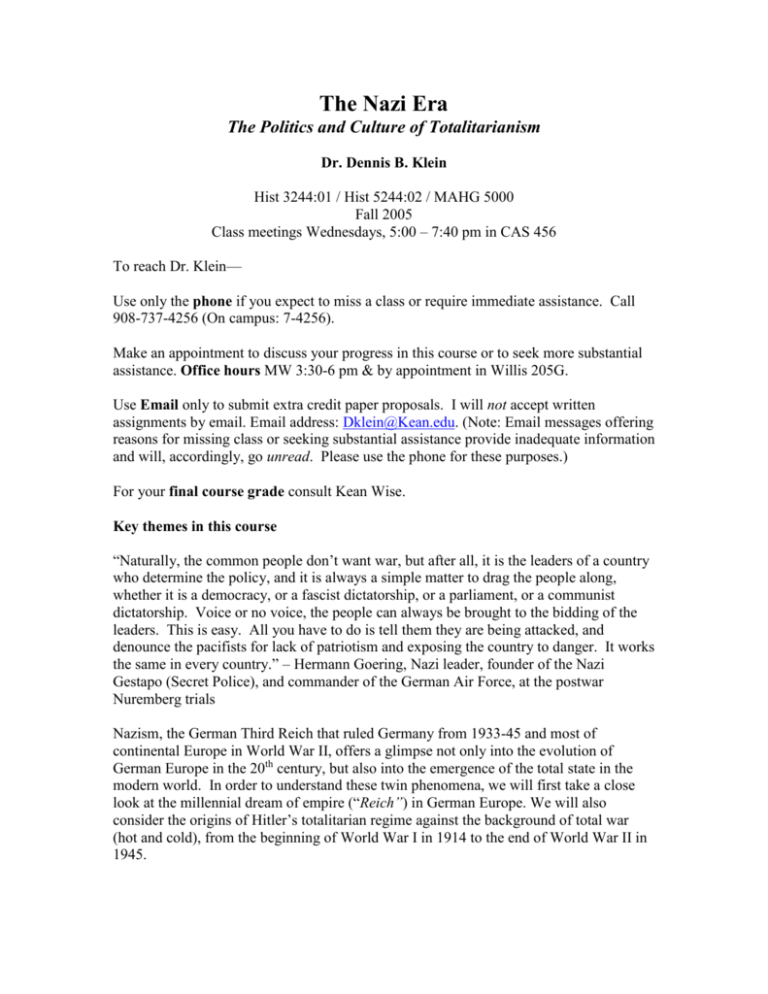
The Nazi Era
The Politics and Culture of Totalitarianism
Dr. Dennis B. Klein
Hist 3244:01 / Hist 5244:02 / MAHG 5000
Fall 2005
Class meetings Wednesdays, 5:00 – 7:40 pm in CAS 456
To reach Dr. Klein—
Use only the phone if you expect to miss a class or require immediate assistance. Call
908-737-4256 (On campus: 7-4256).
Make an appointment to discuss your progress in this course or to seek more substantial
assistance. Office hours MW 3:30-6 pm & by appointment in Willis 205G.
Use Email only to submit extra credit paper proposals. I will not accept written
assignments by email. Email address: Dklein@Kean.edu. (Note: Email messages offering
reasons for missing class or seeking substantial assistance provide inadequate information
and will, accordingly, go unread. Please use the phone for these purposes.)
For your final course grade consult Kean Wise.
Key themes in this course
“Naturally, the common people don’t want war, but after all, it is the leaders of a country
who determine the policy, and it is always a simple matter to drag the people along,
whether it is a democracy, or a fascist dictatorship, or a parliament, or a communist
dictatorship. Voice or no voice, the people can always be brought to the bidding of the
leaders. This is easy. All you have to do is tell them they are being attacked, and
denounce the pacifists for lack of patriotism and exposing the country to danger. It works
the same in every country.” – Hermann Goering, Nazi leader, founder of the Nazi
Gestapo (Secret Police), and commander of the German Air Force, at the postwar
Nuremberg trials
Nazism, the German Third Reich that ruled Germany from 1933-45 and most of
continental Europe in World War II, offers a glimpse not only into the evolution of
German Europe in the 20th century, but also into the emergence of the total state in the
modern world. In order to understand these twin phenomena, we will first take a close
look at the millennial dream of empire (“Reich”) in German Europe. We will also
consider the origins of Hitler’s totalitarian regime against the background of total war
(hot and cold), from the beginning of World War I in 1914 to the end of World War II in
1945.
2
A key aspect of this course will be an inquiry into the Nazis’ resolute mobilization of the
masses. To acquire an understanding of this unprecedented and multifaceted program,
we will screen period films, evaluate the Nazis’ techniques of mass suggestion, and
consider the role of Nazism’s racial ideology.
This is a course based essentially on informed discussion. I will occasionally offer
lectures to establish historical context, but the material of this course appears to raise
more questions than provide answers. Consequently, we will examine source documents,
including films, in order to achieve credible interpretations of pivotal historical events
and developments.
This course is the third of a three-part sequence at Kean exploring Germany’s shaping
influence on modern European history.
“History of Germany, 1805 to the Present” (Hist 4238 and 5238) examines the
origins and ascendancy of a modern national power
“Weimar Germany” (Hist 4241) looks at Germany as a nation negotiating the vast
repercussions of world war and mass politics
“The Nazi Era” (Hist 3244 and 5244, and MAHG 5000) considers Germany as an
example of extensive, or totalitarian, nationalism.
You can take any or all of these courses, in any order, without prerequisites since each
one offers sufficient background material.
Course philosophy, requirements, and grade distribution:
As with any course I teach, I believe the fundamental value of this course, in addition to
its content, is its emphasis on close reading of primary texts and a thoughtful and
documented criticism of them both in class and in writing. To achieve these objectives, I
require my students to engage in a three-part intellectual progression: (1) carefully read
and take notes on all assignments, highlighting for each reading its major themes, key
passages, new words, and your own questions; (2) participate in class discussions,
referring to readings and your notes (in any particular class, you should never feel
satisfied until you understand the material and its significance); (3) in preparation for
take-home exams, review your notes to strengthen comprehension and to discern broad
historical themes for each part of the course.
Undergraduate requirements
Grade distribution
5 page Midterm Take-Home Essay
5 page Final Home Essay
Oral Reports
2-page response paper
40% *
40% *
10%
10%
3
Graduate requirements
Grade distribution
7-page Midterm Take-Home Essay
7-page Final Home Essay
Oral Reports
4-page Response paper
10-page Research paper
25% *
25% *
10%
10%
30%
* Essay exam grades will take class attendance and participation into consideration.
A note on oral reports Oral reports are scheduled reports in class. Everyone is
responsible for reading each assignment in advance and should be prepared to evaluate its
argument critically, but each one of you will have the chance to open discussion on a
particular article. In these oral reports, you must seek to define the reading’s main
arguments, select “quotable” passages and explain why they’re important, consider
unfamiliar terms, and comment on the reading’s contributions and shortcomings. For
complete credit, you must submit hard copy of a completed “In-Class Oral Report” on the
day of your report. Forms are located in your Source Reader.
Submitting a response paper It is important that you immediately reserve one evening –
November 2nd at 8 pm in University Center - for a lecture by Pulitzer Prize winner
Anthony Lewis. Organized by the Jewish Studies program, the lecture addresses topics
that are related to the themes of this course. Your attendance is mandatory and will be
monitored. Your response paper must document the relationships between lecture themes
and course themes. Due by Mon., Nov. 14 at 5 pm in Willis 205. Following are details:
“How Free Is Free Speech?,” an exploration into the perils and prospects of free
speech in the press, in the academy, and overseas in the United Kingdom, where
faculty from Israeli universities were recently a casualty of academic boycott.
Relates broadly to the course theme, the “closed” and the “open” society, and
specifically to speech restrictions in the closed society, such as in imperial
Germany, that contrasts with or can threaten protected speech in the open society
– the United States and the United Kingdom.
A note on the final essay exam The final take-home exam offers the chance for a longer
“shelf life” than most of your collegiate written work. This term, with your permission, I
will submit the best papers to a faculty committee, constituting members of the
university’s Faculty Seminar on Comparative Cultures, for selection of even better papers
for a campus roundtable, or panel, of students in the spring term addressing the Seminar’s
2005-06 theme, “Representations of Genocide and Resistance.” This take-home essay
will be a great opportunity for you to share your work with the larger campus community.
Selected roundtable papers will also be published, along with faculty papers on the same
subject, in an E-Book sponsored by the Office of Research and Sponsored Programs.
(You can read papers from the three E-Books currently online at
4
www.Kean.edu/~ORSP.), covering the themes “Violence and the State” and “Empire and
Cultural Conquest” (two volumes).
A general word on writing successful essays For full credit on your written work, you
must observe style guidelines located in your Source Reader called “Writing Effective
Essays” (WEE). This is especially important for constructing successful take-home
exams and (this is important too) for citing your sources.
Course policies and procedures
Class participation Expressing yourself before your peers is as important a skill to master
as reading or writing. I will gladly reward your participation in class. I will do so by
periodically considering your active involvement based on completed reading
assignments, and by raising or lowering each of your take-home exam grades
accordingly. A “B” on the first essay exam, for example, would be entered as a B+ or an
A- if your class participation for that part of the course was regular and informed.
Conversely, a “B” on a take-home exam would be entered as a B- or a C+ if you rarely
participated or didn’t participate at all in class for that section of the course. Many
students, whose written work could have been stronger, have earned high grades (and
really liked my courses) because they routinely come prepared for active participation.
Missing or arriving late to class Attendance is fundamental and is something I take
very seriously. You need not inform me about occasions when you need to miss class. If
you miss or arrive late to more than one class during any part of the course, I will lower
your take-home exam grade for that part by one increment for two or three missed classes
or late arrivals, by two increments for four or five missed classes or late arrivals, etc. As
an example, if you miss two classes in the first part of the course, a B on the 1st takehome exam would become a B-. I will monitor class attendance at the beginning of each
class. Students who otherwise have gotten good, hard-earned grades, have received low
grades in my courses due to excessive absences or late arrivals. Please note: If you miss
class, it is strictly your responsibility to ascertain subsequent class meetings and
assignments (you can call me or consult another student).
In general, please observe customary classroom protocol by arriving to class and
submitting original papers on time (late papers will incur penalties), remaining in class
throughout the period, and by taking notes on reading assignments and bringing them and
relevant source material to each class.
Class will not meet, nor will there be office hours, on Wed., Oct. 12 and on other
possible dates as needed. Class on November 2nd will meet at 8:00 in University Center
for the Anthony Lewis lecture instead of the usual 5 pm hour. Unscheduled class
cancellations will be announced in class.
I enjoy discussing the intriguing implications of the origins and virulence of the Nazi
totalitarian state, and look forward to exploring them with you in and outside class. Feel
5
free to contact me anytime. I can promise that this course will reward your involvement. -DBK.
Required reading
The first five books listed below are available for purchase at the Kean University
bookstore. In addition to these texts you will receive at no charge to you a Source Reader
created specifically for this course.
Thomas Mann
Death in Venice and Seven Other Stories
Knopf 0679722068
Adolf Hitler
Mein Kampf
Houghton Mifflin 0395925037
W.G. Sebald
On the Natural History of Destruction
Random 0375504842
Eric Rentschler
The Ministry of Illusion: Nazi Cinema and its Afterlife
Harvard 0674576403
Hagen Schulze
Germany: A New History
Harvard 0674005457
Dennis B. Klein
The Nazi Era: A Source Reader
Kean University
Class Schedule
The class schedule amounts to a course outline and is essential for helping you
organize key themes and supporting sources. Please bring it to each class and consult
it regularly. Changes to the class schedule will be announced in class. Students who
miss class are responsible for ascertaining subsequent class meetings and assignments.
SR = Source Reader. All other readings in books (designated below by author’s last
name), which you may at the Kean University bookstore.
Sept. 14
Introduction: Discussion of course, books and assignments.
The Culture of Totalitarianism
George Orwell, “Literature and Totalitarianism” (1941)(Handout)
“Reflections on the Historical Significance of the 3rd Reich”
(Handout)
Lecture: The German Reich in History, 962-1871
Read (in class):
6
Sept. 21
The Second German Reich
Lecture:
Germany’s Startling Ascent
Readings:
Schulze, Chs. 5, 7, 8
Seot. 28
The “Sonderweg” Question
Readings:
Otto von Bismarck, “Iron and Blood” (1862) (SR)
Heinrich von Treitschke, “Politics” (1862-1896) (SR)
Richard Wagner, “Judaism in Music” (1850) (SR, document pgs. 1-8)
“The Use and Abuse of History” Reflections on the Place of the Third
Reich in German History—The Historical Relationship Between
Bismarck and Hitler” (SR)
Lecture:
The Great War (1914-1918)
Oct. 5
Total War and the Politics of Redemption (World War I)
Readings:
Schulze, Ch. 9
Ernst Junger, The Storm of Steel: From the Diary of a German Storm
Troop Officer on the Western Front (1920) (SR)
Treaty of Versailles (1919) (SR)
Thomas Mann, "Mario and the Magician" (1929)
Lecture:
Weimar Culture and the Culture of War (1-6)
Oct. 12
No Class
Oct. 19
Hitler and Utopian Politics in Weimar Germany
Readings:
Schulze, Ch. 10
Rosa Luxemburg, “The War and the Workers” (1916) (SR, document pgs.
1, 8-18)
7
Adolf Hitler, Mein Kampf, (1923-25)
Volume I (1923), Chapter 5
Volume II (1925), Chapters 1,4,6,8
Lecture:
The Rise of National Socialism (6-7)
Oct. 26
The Psychology of Totalitarianism
Readings:
Rentschler, “A Legend for Modern Times: The Blue Light, ” 27-51
Film:
The Blue Light (1932)
Lecture:
Nationalization of the Masses
Nov. 2
Due:
Midterm Take-Home Essay Exam: Preconditions of Nazism Submit
your exams in hard copy by 5 pm in my mailbox, Willis 205, or beneath
my office door, Willis 205G. No 5 pm class meeting.
Lecture:
8:00 pm in University Center: “How Free Is Free Speech?” by Anthony
Lewis. See pg. 3 for details. Free for students with Kean University ID.
Nov. 9
The Politics of Mass Suggestion
Readings:
*Hitler, Mein Kampf, Vol. I., Ch. 6 (“War Propaganda”)
Lecture:
Propaganda and Mass Suggestion
Guest lecture by Alan Robbins (Department of Design)
Lecture:
The Consolidation of Power (7-12)
Nov. 14 (Monday)
Due:
Anthony Lewis response paper. See pg. 3 for details. Submit by 5:00
pm in my mailbox in Willis 205 or beneath my office door, Willis 205G.
8
Nov. 16
Gleichschaltung: The Totalitarian State
Readings
Schulze, Ch. 11
McAllister, “The Degenerate Art Exhibit…” (SR)
Rentschler, “Emotional Engineering: Hitler Youth Quex,” 53-69
Film:
Hitler Youth Quex (1933)
Lecture:
The Master Race (1933-38)
Nov. 21 (Monday)
Due:
Graduate paper proposals (1 page) by 5 pm in Willis 205.
Nov. 23
The Racial State I (1933-38)
Readings:
Hitler, Mein Kampf, Vol. I, Ch, 11 (“Nation and Race”)
“Protocols of the Elders of Zion” (c. 1898) (SR)
First Racial Definition (1933) (SR)
Hitler, "Why the Nuremberg Laws” (1935) (SR)
Law for the Protection of German Blood and Honor (1935) (SR)
Heydrich, "Kristallnacht--A Preliminary Secret Report" (1938) (SR)
Security Service Report on the Kristallnacht (1938) (SR)
Lecture:
The Holocaust (1939-45)
Nov. 30
The Racial State II (1938-45)
Readings
Rentschler, “The Elective Other: Jew Suss,” 149-69
Film:
Jew Suss (1940)
Lecture:
Germany’s Quest for World Empire (1933-45) (12-21)
9
Dec. 7
World War II and the Final Solution
Readings:
Schulze, Ch. 12
Himmler, Speech before SS Group Leaders, Posen, Poland (1943) (SR)
Wannsee Protocol (1942) (SR)
Rentschler, “Self-Reflexive Self-Destruction: Munchhausen,” 193-213
(time permitting)
Film:
Baron Munchhausen (1943) (time permitting)
Lecture:
The Burden of the Past in Postwar Germany
Dec. 14
The Rubble Years: Final Reflections
Readings:
W.G. Sebald, On the Natural History of Destruction (2003)
Monday, December 19
Due:
Graduate student research papers. Submit your paper (hard copy) in my
office mailbox, Willis 205, or beneath my office door, Willis 205G by 5
pm.
Dec. 21
Due:
Final Take-Home Essay Exam: Political and Racial Persecution
Submit this exam, and all other course papers, now and in hard copy in my
office mailbox in W-205 or beneath my office door (W-205G) no later
than 12:30 pm. No extensions possible. No class meeting.
Unpublished © 2005 by Dennis B. Klein
Nazi era syllabus-1.doc
All rights reserved




